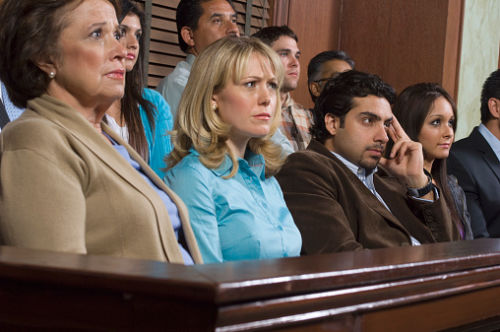Menu
Should a Criminal Defendant Testify at Trial?
January 27th, 2017

It’s considered one of the most difficult questions a criminal defense lawyer faces in preparing for a trial — should your client testify?
In actuality, except for in a few cases, the question, "Should a criminal defendant testify?" is pretty straightforward.
Why My Clients Rarely Testify
As a Wyoming criminal defense attorney, I can count on one hand the number of times I've had my client testify. As a rule, criminal defense lawyers will not allow a defendant to testify unless it is absolutely necessary. Instead, we stand on the constitutional rights of the accused and demand that the prosecution prove its case beyond a reasonable doubt.
In any criminal trial, the defendant has the right to testify or not to testify. If a defendant chooses not to testify, this fact cannot be held against him or her in court. The court must instruct the jury that the defendant has a constitutional right not to testify, that the choice not to testify cannot be held against the defendant, and that the defendant is presumed innocent regardless of whether he or she testifies.
Ultimately, the client decides to whether to take the witness stand. But it is my job to advise my clients whether I believe they should testify. And in all but a few cases, I strongly recommend against it.
But Don't I Need to Tell the Jury I'm Innocent?
All criminal defendants are presumed innocent until proven otherwise. There would have to be a very good reason, beyond the defendant's innocence, to recommend that a defendant testify in his or her own defense. The risk that something could go wrong during the defendant's testimony is simply too great, especially when, in most cases, there is little to be gained from having the defendant testify.
A criminal trial can be very stressful, especially for someone with much to lose. Many people do not do well under stress and may become agitated, irritable, or nervous. Jurors tend to place too much emphasis on these factors, yet ignore the fact that even an innocent criminal defendant who is well-prepared can, quite naturally, be nervous. Nervous people often display poor body language, a poor demeanor, or respond poorly to questions, especially on cross-examination. Any or all of these factors can lead a jury to disbelieve a defendant.
Cross-Examination is Notoriously Difficult
Defendants usually don't have much practice testifying. By contrast, the prosecution's witnesses are often law enforcement officers and experts who have testified hundreds of times. They know what to expect, how to look at the jury, how to answer a question, when not to answer a question, and how to withstand a difficult cross-examination.
This inequity is further compounded by the fact that cross-examinations can be grueling, and prosecutors are trained to draw out information. The relentless barrage of questioning can overwhelm even the most-prepared of defendants.
Because most criminal defendants have never gone through a rigorous cross-examination by a relentless prosecutor, it is impossible to know how a defendant will do. It is all-too-easy for a defendant to get confused by an artfully-worded question, or a question that the defendant did not fully understand. These minor mistakes can quickly discredit the defendant, in which case it is better if the defendant had not testified at all. And in DWUI cases, there is almost no need for the defendant to testify because the prosecution will stress that the police officer, whose sobriety is not in question, was in a better position to objectively observe what happened during the traffic stop and DWUI investigation. Defendant’s testimony, therefore, is of little value in finding the defendant not guilty.
The Ideal Defense Focuses on Holes in the Prosecution's Case
Ideally, the jury should be focused on the prosecution’s case, looking critically at the police investigation and any inconsistencies in the prosecution's version of events. Having the defendant testify can often muddy the waters by adding the defendant’s version of events to the mix. If the defendant seems edgy, tense, confused, or nervous — which is frequently the case in the high-pressure atmosphere of a criminal trial — the defendant's version of events may seem like a fabrication, even if it is completely honest.
Jurors can be notoriously fickle, breathing untold significance into an otherwise benign issue. Once the defendant testifies, jurors tend to shift the burden of proof to the defendant, weighing the prosecution’s case against the case presented by the defendant, when in actuality the defendant has nothing to prove and the burden of proof lies entirely with the prosecution.
Of course, each case is unique, and there are always pros and cons to consider. However, I am very reluctant to put my client on the stand to testify.
Accused of a Crime in Wyoming or South Dakota? Contact Me Today
If you are facing criminal charges in Wyoming or South Dakota, you need a team of experienced criminal defense professionals on your side. Contact Just Criminal Law today for a free initial consultation.
Based in Gillette, Wyoming, Just Criminal Law represents people in Northeast Wyoming and Western South Dakota. Call 307-686-6556, email office@justcriminallaw.com, or complete our online form.
DISCLAIMER: The information contained in this article is offered for educational purposes only. This information is not offered as legal advice. A person accused of a crime should always consult with an attorney before making decisions that have legal consequences.
Categories: Criminal Charges - General Questions





